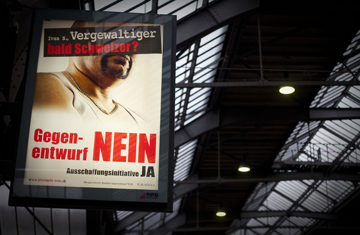
A poster at the train station in Zurich, Switzerland, Nov 18, 2010 shows a man who's face is covered with the words "Ivan S, rapist and soon to be Swiss?"
Sunday was a great day for Lise Thevenaz. On the morning of Nov. 28, the Geneva receptionist, whose teenage son was brutally beaten last summer by a band of immigrants from Eastern Europe, had voted "yes" in a referendum proposing to deport foreigners who commit serious crimes in Switzerland. When she found out Sunday night that 53% of voters also supported the proposal, "I thought that finally we would be able to feel safe in our own country," she says.
That's the message the vote's sponsors, the populist Swiss People's Party (SVP), have been trying to push through, despite repeated criticism from other parties and human-rights groups that the proposal is discriminatory and racist. Sunday's referendum came exactly a year after another controversial SVP initiative to ban the construction of minarets on mosques in Switzerland. That proposal was approved by 57% of the electorate but remains highly contentious.
Under the terms of the latest referendum, the government must expel, without possibility of appeals, foreigners convicted of serious crimes — ranging from murder, rape, armed robbery, and drug trafficking to abusing Switzerland's welfare system — after they complete their prison sentences. Right now, decisions on whether or not to expel foreigners convicted of serious crimes are made on a case-by-case basis. It is expected that the new legislation will quadruple the number of deportations from the current 350-400 a year.
On the ballot, the government tried to counter the SVP proposal with its own, watered-down version calling for the deportation of foreigners convicted of only the most violent crimes, but that measure was rejected by the voters.
Swiss citizens like Thevenaz may be happy with the outcome of the vote, but it "will create serious problems for Switzerland with regard to its international legal obligations," says Marcelo Kohen, professor of International Law at the Graduate Institute of International and Development Studies in Geneva. He says the legislation would violate international law that forbids deportation to countries where a person could face persecution, torture or death. Amnesty International immediately reacted to the vote, saying in a statement that "Switzerland cannot, and must not, allow popular — and xenophobic — initiatives to override its obligations under international law."
The new legislation, which will be included in the Constitution, would also break the E.U.-Swiss agreement on freedom of movement if the deported foreigner is a national of a European Union country. While Switzerland is not a member state, it has signed a number of treaties with the E.U., including ones that allow citizens of member nations to live and work in Switzerland. "It is not difficult to foresee that cases against Switzerland will be brought before the European Court of Human Rights and result in tensions between the E.U. and Switzerland," Kohen tells TIME. "The E.U. could even unilaterally terminate the E.U.-Switzerland agreement on free movement."
So far, the E.U. has not said what, if any, sanctions it would impose, but the European Commission has issued a statement saying it expects Switzerland to respect its treaties. That leaves the Swiss government with the challenging task of drafting legislation that reflects the results of the vote while respecting the country's agreements with the E.U.
The SVP says that the outcome of the vote reveals not only the Swiss people's concern with the rising crime rate, but also their dissatisfaction with the government's liberal immigration policy, which, the party says, has allowed too many foreigners into the country. Official numbers show that about 23% of Switzerland's 7.7 million people are foreigners — one of the highest rates in Europe.
During the four-month-long referendum campaign, the SVP brought up recent statistics showing that about 70% of inmates in Swiss prisons are foreigners — both legal and illegal. "Switzerland can't become the land of milk and honey for foreign criminals," SVP legislator Walter Wobmann argued during a parliamentary debate on the initiative in the run-up to the vote. The party says that all legal immigrants to Switzerland "must sign a declaration promising to respect our laws."
With the divisive campaign finally over, experts are left debating the reasons that pushed the usually liberal Swiss to take a tough stance on foreign criminals. Ueli Maeder, professor at the Sociology Institute in Basel, thinks it comes down to the sense of "subjective insecurity" — the crime rate in Switzerland may be rising, but it's still relatively low — as well as the fear of losing the prosperity and high standard of living that the Swiss have enjoyed for decades. "For populist politicians it's easy to play with these fears and to create scapegoats," he says. "As it turns out, this strategy worked perfectly."
